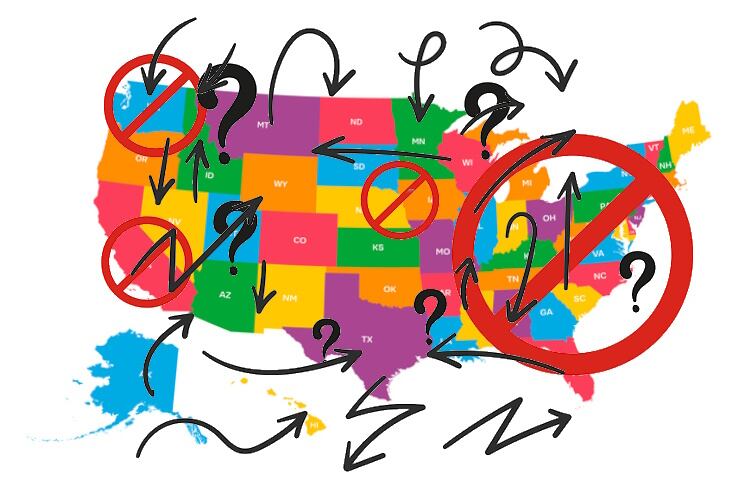What starts as a state issue can quickly evolve into a situation that will affect bakers across the country. Also, the fluid pace of the legislative processes and priorities make it a quagmire for the uninformed.
Effective tracking is key to avoid violating the expanding patchwork of state ingredient bans, but many bakers – and allied partners – don’t have the time, the contacts or the wherewithal to stay on top of the situation.
This is where a membership with the American Bakers Association (ABA) – with its dedicated team of inhouse legislative and regulatory experts – really comes to the fore.
ABA’s newly launched State Affairs Working Group works to enact legislation on the state level that supports the bakery industry. At the association's recent Convention in Scottsdale, Arizona, Bakery&Snacks met up with Bill Dumais, ABA’s state affairs manager, to thrash out the opportunities as well as threats posed by state legislation.

Bill, you haven't been with the ABA for long. Tell me of your path to this position.
I joined the ABA team in mid-January, after working for a policy think tank as their legislative outreach manager covering 20 states in New England, the south and parts of the mountain west.
I actually got my start right out of college in the dietary supplement industry with an organization called the Council of Responsible Nutrition, which shares many similarities with the structure of the ABA but dealing with a different aisle of the grocery store. That’s where I became familiar with FDA policy and regulation and got involved on the ground floor as a recent college grad and then as a government relations professional.
I've carried those experiences into this role at ABA.
And what is your role at ABA?
As state affairs manager, I am the lead staffer for our state affairs working group – one of the professional working groups within the ABA – that meets once a month to provide different legislative and regulatory updates for our members.
In addition, I’m registered as a state lobbyist in several states, where we are monitoring some of the issues that are relevant to our members. It’s interesting that some of the issues that we’re following at the state level are similar to those we’re following at the federal level, but with different impacts for our members.
The first is the ingredient ban legislations. Those bills – if enacted into law – will have ramifications for our members.
The second is packaging and sustainability. Four states – California, Oregon, Colorado and Maine – have introduced and enacted extended producer responsibility laws. Many of our members use plastic packaging and different forms of packaging for both bulk wholesale and direct to consumer packaging. Those states are in different stages in the process of their regulatory rulemaking, as well as the development of their standards as they work in tandem with their selected producer responsibility organization (known as PRO).
There are ways for our members to engage with state legislators and develop relationships at the state level, which is critical, especially in states with these priority issues. Having relationships with state legislators and familiarizing them with the commercial banking sector is very important for future success of both the government relations program here at ABA as well as the industry as a whole.
What is ABA’s official stance on these foods additive bans?
We are evaluating each bill that comes – and although similar to California's Assembly Bill 418, which was enacted into law in October 2023 – they’re not all the same.
There are some ingredients that affect the greater industry as a whole and some that are, to my understanding, being cycled out. So we take each bill on a case-by-case basis and determine where we should focus our priorities. In some cases – in states that have already adjourned for the year and the bill failed to meet different deadlines for consideration – those bills have withered and died on the vine. So we’re prioritizing our focus on those key year-round states that have introduced bills that will impact some of our members.
Are you expecting more states to follow suit?
There’s a saying that says, ‘what goes on in California, goes on in the rest of the country’.
Will every state enact a state legislative ban? Probably not likely, because each state is different.
We’ve already seen copycat legislation that resembles the California Food Safety Act. But it depends on how far those bills are going to be determined, state by state. In those states that have already adjourned, those ingredient bans have died with the session ending. For the year-round states, longer session means anything is possible. There’s more time.
Do you see more states introducing more bans (beyond those already on the slate)?
California, in essence, did open a Pandora's box. Up until the enactment of AB 418, most states had attempted to ban certain ingredients in an ingredient-by-ingredient basis, but California actually did it. Now we have 13 states that have introduced ingredient ban legislation.
Earlier this year, California introduced Assembly Bill 2315, which adds onto to AB 418, banning other food additives like titanium dioxide from sale in schools. A different tact and approach from the ban of those four ingredients included in AB 418.
Indiana proposed a bill for high fructose syrup – but that was a bit of an outlier. The lead sponsor was the sole sponsor of the bill and a member of the minority party. Whether it is a blue or red state, it helps to be a member of the majority. The Indiana bill didn’t receive much support or a committee hearing and died when Indiana adjourned back in March.
Do you see the state bans being a Democratic or Republican driven trend?
Most of the ingredient bans have been introduced in predominantly Democrat-led state legislatures. We've seen a few introduced in Republican-led state legislatures, but again, there really is not much support.
The outlier, I would say is Pennsylvania, where they’ve introduced two bills – one pertaining specifically to food color additives, the other dealing with some of those ingredients that we’ve seen in California and Illinois. Those two bills in Pennsylvania do have bipartisan support, which is again something we really haven't seen in the other states. They don’t adjourn until November 30, so that is something that we are following.
What is your recommendation to your members with regards to these bills?
First and foremost, join the state affairs working group if you’re interested in learning more and being up to date on the state legislative affairs. Our team has worked with some of our members to get congressional members to their baking facilities. There’s really no better way than to show a legislator what you do as an industry or what you do as a facility in their backyard.
As a former English teacher of mine said, ‘show, don’t tell’. There’s a different merit when you put something tangible in front of a state legislator and they see how the manufacturing process works, the intricacies as well as the considerations.
And if you’re within driving distance of your state capital, set up a meeting with your state legislators. State legislators are not all policy experts. In many cases, state legislatures are citizen legislatures: they meet only part of the year and in many cases, don't have full-time administration staff: it’s just them.
A citizen legislature refers to a legislative body whose members are not career politicians but rather individuals who have other professions or occupations outside of politics. In a citizen legislature, lawmakers typically serve part-time or for limited periods while maintaining their primary careers or jobs. These legislators are often seen as representing a broader cross-section of society, bringing diverse perspectives and experiences to the legislative process.
New Hampshire, for example, is a citizen legislature and has 400 members of the House of Representatives, each making an annual salary of only $100 a year. So, for those ABA members with operations in New Hampshire, it’s all the more important to educate those state legislators because they may not have a manufacturing background.
What do you see being the biggest challenge this year?
Packaging and the state bans on ingredients are the two issues that we're most closely following.
Being an election year, the state legislative sessions are generally shorter: 46 of the 50 state legislatures will meet this calendar year; some have already started, some are already in the midst of their sessions, some have already adjourned. And some are going all the way up to the end of the year.
It’s good that some of these state legislative sessions are shorter because it means if the bills can't get past the chamber of origin, they die. They failed to meet further consideration before moving on. But each state has different deadlines, so knowing at least a little bit of that is important.
In 2025, all 50 states will be back in session with a brand new crop of state legislators and that means a new set of challenges and possibilities for the industry.
Where is ABA on PFAS?
AMERIPEN develops and advocates positions on issues related to packaging and the environment. Members include brand owners, packaging converters, materials suppliers and recyclers.
ABA is an affiliate member of AMERIPEN, a trade association that represents the entire packaging chain. We leverage that membership to ensure our members are updated and PFAS is something that we’re following, both at the federal and state level.
There are several states, such as Connecticut, that have introduced bills pertaining to PFAS. And, as we’ve seen from the FDA’s announcement, there’s a move away from PFAs, but again, there’s still lots of considerations.
On February 28, the US Food and Drug Administration (FDA) announced that grease-proofing substances containing Per and Polyfluoroalkyl Substances (PFAS) are no longer being sold by manufacturers for food contact use in the US market.
The completion of the voluntary market phase-out of these substances used on food packaging paper and paperboard eliminates the primary source of dietary exposure to PFAS from authorized food contact uses.
In addition, the FDA confirmed that other manufacturers have voluntarily stopped sales of other food contact substances – which contain different types of PFAS – intended for use as grease-proofing agents in the US.
Being an election year, do you see much change happening?
Similar to what is happening in Congress, we follow what happens in the states. There’s somewhere in the ballpark of 6,000 to 8,000 state legislative members across the country, both in the House and the Senate.
It’s still a little too early to tell if there’s any potential for state chambers to flip or to change hands in terms of Democrat or Republican control. During the 2022 cycle, there were three chambers that did switch from Republican-led control to Democrat-led control.
RegASK is another service that uses AI to stay on top of the latest developments. Listen to our conversation with CEO Caroline Schleifer here.
That, of course, will mean brand new leadership, brand new committee members, as well as brand new committee chairs. In a state like Pennsylvania, for example – where there are 203 members of the House of Representatives – in 2022, it switched from Republican control to Democrat control after redistricting. That meant new leadership, new committee chairs, and again, it affects different priorities. It’s a little hard to follow every single state legislative race, but generally there’s an about roughly 80% to 90% of incumbents that do win re-election at the state level.
In the 2022 cycle, there have been a number of retirements similar to what we’re seeing in Congress: some states had between about 11% to 15% turnover. Some states – depending on the side of the legislative body – may have had as close to 40% turnover in retirements and brand new legislators coming in.
It’s fascinating and a lot to monitor because our members operate in all 50 states. So, if there’s a change in leadership or if there’s a speaker of the house or senate president who is stepping down, that’s good to know. Even in those states where there isn’t an active legislative or bill that we’re following.
What is your takeaway message?
I love hand raisers who want to be involved and know what’s going on in their backyards.
Much of what happens at federal level is equally as important at state level. Federal and state lean on each other, and – we’ve seen this countless times – many members of Congress come in with state legislative experience.
We welcome involvement from our members in joining the state affairs working group, as well as the upcoming Bakers Fly-In and Policy Summit Washington DC [June 11-14]. Ask questions and be engaged.
The US states to have introduced legislation
(EWG: As of April 22, 2024)
California: AB 2316 would ban the food additives Red Dye No 40, Yellow Dye No 5, Yellow Dye No 6, Blue Dye No 1, Blue Dye No 2, Green Dye No 3 and titanium dioxide from food served in public schools in the state. The remaining bills under consideration address food chemicals manufactured, sold or distributed in the state.
Illinois: SB 2637 would ban the food additives potassium bromate, propyl paraben, Red Dye No 3 and BVO.
Maryland: SB 1136 would ban the food additives potassium bromate, propyl paraben, Red Dye No 3 and BVO.
Missouri: HB 2474 would ban the food additives potassium bromate, propyl paraben, Red Dye No 3 and BVO.
New Jersey: A 4132 would ban the food additives potassium bromate, propylparaben, Red Dye No 3 and BVO.
New York: S 6055A would ban the food additives potassium bromate, titanium dioxide, propyl paraben, Red Dye No 3, BVO, BHA and azodicarbonamide.
Pennsylvania: HB 2116 would ban the artificial food dyes Red Dye No 3, Red Dye No 40, Yellow Dye No 5, Yellow Dye No 6, Blue Dye No 1 and Blue Dye No 2. HB 2117 would ban the food additives potassium bromate, BVO and BHA.
Rhode Island: H 7300 would ban the food additives potassium bromate, propyl paraben, Red Dye No 3 and BVO.
South Dakota: HB 1169 would ban the food additives potassium bromate, propyl paraben, Red Dye No 3 and BVO.
Washington: HB 1921 would ban the food additives potassium bromate, propyl paraben, Red Dye No 3 and BVO.
West Virginia: HB 5086 would ban the food additives potassium bromate, propyl paraben, Red Dye No 3 and BVO.





